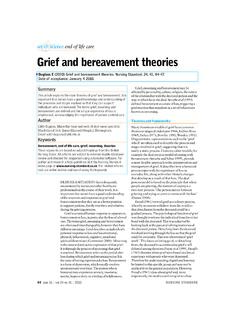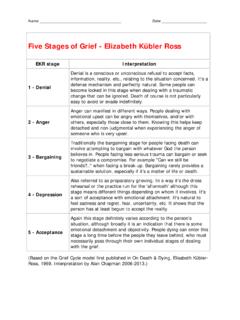Transcription of grief - the process
1 THE process OF grief . It is often not made easy for us to grieve in our society. We can, however, grow and mature as human beings if we are allowed to grieve in a healthy way. grief is a process not a state. It takes time to work through. grief is a natural response to a significant loss. The most extreme of such losses is experienced through death of someone close with whom we had a meaningful relationship. We can also experience significant grief through other losses through divorce, separation, abortion, and even our lifestyle or a job. However, the response to these losses is similar. Death is the most significant, maybe because of: The finality, Death confronts one's own mortality or finiteness.
2 Whatever the loss, there is little value in making comparison about the feeling one has. There is no consolation in hearing there is someone worse off than you are; hurting more; lost more. If you are hurting, it does little to hear about how someone else is hurting. grief will be dependent on a number of factors including: Degree of attachment to the person lost. Degree to which person enriched your life. Quality and length of relationship. Nature of death. It will be influenced by many other factors. Understanding the process of grief Colin Murray Parkes, in his book Bereavement , suggests four phases in the grief process . 1. NUMBNESS: emotions are frozen 2.
3 PINING: desire to bring back the lost 3. DEPRESSION: preoccupation with the loss 4. RECOVERY: development of a renewed identify Based upon Elizabeth Kubler-Ross' research on death and dying, the following model for understanding the normal reactions to grief and loss has been developed. Individuals experiencing grief are likely to experience a range of these emotions as they work through the grief process . S:\Resource Info Handouts\ grief - the ResolutionsRTK The process of grief 2. The grief and Loss Curve . Shock New Beginnings Denial Planning Bargaining / Guilt Acceptance Anger Depression Common Individual Responses to grief Outlined below are some of the normal reactions to grief : EMOTIONAL.
4 Shock: disbelief at what happened feeling numb, as if things are unreal Fear: of one's own mortality for the safety of oneself or one's family apparently unrelated fears Anger: at the injustice and senselessness of it all generalised anger and irritability how this could happen to such a good person Sadness: about the loss both personally and professionally flash backs or triggers to previous grief and loss about the loss of feeling safe and secure feeling depressed or flat for no reason Guilt: for having appeared helpless or emotional for not behaving as you would have liked for unresolved issues or conflict with the person for not doing upon reflection what you feel might have made a difference S:\Resource Info Handouts\ grief - the ResolutionsRTK The process of grief 3.
5 PHYSICAL. Sleep: difficulty getting off to sleep because of intrusive thoughts restless and disturbed sleep feeling tired and fatigued Physical general agitation and muscle tension problems: headaches or general aches and pains feeling generally unwell other physical signs and symptoms THINKING. Memories: frequent thoughts or images of the person flashbacks or feelings of reliving past grief and loss experiences attempts to shut-out the painful memories real or imagined pictures of what happened jumping into your head Dreams: dreams and nightmares about what happened unpleasant dreams of other frightening thoughts Confusion: difficulty making simple decisions inability to concentrate and memory problems not being able to express yourself fluently verbally feeling confused generally BEHAVIOUR.
6 Social: withdrawal from others and a need to be alone easily irritated by other people feelings of detachment from others loss of interest in normal activities and hobbies Work: not wanting to go to work, poor motivation poor concentration and attention sense of lost purpose in your work Habits: increased use of alcohol, cigarettes or other drugs loss of appetite or increased eating loss of interest in enjoyable activities Granger Westberg, in Good grief explains the grief phases in this descriptive way: 1. We are in a state of shock. 2. We express emotion. 3. We feel depressed and very lonely. 4. We may experience physical symptoms of distress. 5. We may become panicky.
7 6. We feel a sense of guilt about the loss. 7. We are filled with hostility and resentment. 8. We are unable to return to usual activities. 9. Gradually hope comes through. 10. We struggle to readjust to reality. S:\Resource Info Handouts\ grief - the ResolutionsRTK The process of grief 4. Many people struggle and go forward and regress many times as they work through the process . In talking about phases or stages of grief , it is important to acknowledge the individuality of each grieving person and to be careful not to impose some pattern of grieving on others. Moving Forward Through the grief process Some of the most important needs of the person experiencing grief can be summarised as follows: 1.
8 To feel SUPPORT. We need to recognise that bereavement raises all sorts of feelings, and that to cope people need the care, love, support and understanding of others. 2. To face REALITY. The process of recovery is linked directly to acceptance of the loss. Acceptance will not come until reality is faced. 3. To express FEELINGS (emotional release). It seems important to many grieving people that emotional release be encouraged. Grieving people should be helped, encouraged, and allowed to express their feelings. This may mean tears, talking, and other acting out. Too often would be helpers suppress rather than encourage and facilitate emotional release. In our society, people often get uncomfortable if you demonstrate your reaction to loss and pain openly.
9 They may say: Buck-up . It's time to get over it . It's God's will.. Brighten-up, you're upsetting the team.. Although these comments are well-intentioned, they may prevent you from expressing your feelings. We need to recognise that being upset is healthy and helpful rather than harmful. Negative terms are often used if you get upset: Breaking down Falling apart Cracking-up Not coping Positive terms are often used if you demonstrate restraint: Brave Strong Courageous Holding yourself together Coping well Our culture with grief and choice of language around grief and loss may prevent you from expressing your feelings. S:\Resource Info Handouts\ grief - the ResolutionsRTK The process of grief 5.
10 4. To move towards the RE-ESTABLISHMENT of self (on going living). For many this is difficult and for a period of time, often many months, painful and at times unthinkable. Grieving people need all the care, encouragement and support they can get to enable ongoing living to be increasingly possible. Seeking Extra Support and Assistance Some people benefit from extra help in overcoming the effects of grief and loss. Do not be reticent to get help if you think you need it: it is not a sign of weakness or an indication that you are not in control. Often, the help you receive will be short and simple, and will prevent you from having longer term problems. You may need further assistance if: The problems described above are particularly severe, or if they continue for more than five or six weeks.













